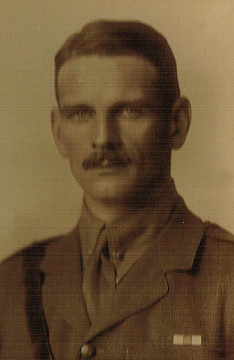Richard Edward Warde (1884-1932)
Major "Dick" Warde M.C., of the Scots Guards
He was born at Sevenoaks, Kent, and was educated at Tonbridge School. He served in France during World War I with the 2nd Battalion, Scots Guards. In the Battle of Loos, 1915, he received a minor wound in the leg before being more seriously wounded in the arm the following day. He was twice Mentioned in Despatches and was awarded the Military Cross (M.C.) in 1916. From then until the end of the war he was employed in intelligence work, retiring with the rank of Major. He was described as, "an uncomplicated extrovert, very much an outdoor man, with the look of a buccaneer".
A story of him was told that, "during the war he had the terrible duty of commanding a firing squad for the execution at the Tower of London, of a spy, who being a soldier, avoided hanging. It is said that Dick sat up all night drinking with the condemned man, until the German passed out and never knew that dawn had come." While he was injured and convalescing at Dorchester House, he managed to win the heart of Muriel Wilson, not only one of the wealthiest heiresses in England, but also once described as, "Great Britain's most beautiful girl". They were married in 1917, albeit "not very happily". Nonetheless, her wealth allowed them to divide their time between Cannon Hall in London and the Villa Maryland on the French Côte d'Azur. They died without children.
A story of him was told that, "during the war he had the terrible duty of commanding a firing squad for the execution at the Tower of London, of a spy, who being a soldier, avoided hanging. It is said that Dick sat up all night drinking with the condemned man, until the German passed out and never knew that dawn had come." While he was injured and convalescing at Dorchester House, he managed to win the heart of Muriel Wilson, not only one of the wealthiest heiresses in England, but also once described as, "Great Britain's most beautiful girl". They were married in 1917, albeit "not very happily". Nonetheless, her wealth allowed them to divide their time between Cannon Hall in London and the Villa Maryland on the French Côte d'Azur. They died without children.




